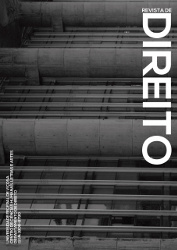Global law before the State? On Canon Law as a transnational regime
DOI:
https://doi.org/10.32361/2023150115361Keywords:
Constitution, Secularization, Harold Berman, Concepts, PaleonymAbstract
According to Harold Berman, modern Western law is based on the establishment of canon law in the eleventh and twelfth centuries. By this account, the original role-model for our modern concept of law is already transnational, and the idea of law being a characteristic instrument of nation-states is only a subsequent event. The article discusses this thesis and scrutinizes its relevance for current attempts to develop a concept of transnational law and transnational constitutionalism. In doing so, it also raises a critical question: if our modern concepts of law are based on canon law, is it possible that some main characteristics still reflect this origin? Could it be that a certain motif of the unity of the constitution' - a motif which, according to Gunther Teubner, underlies all kinds of societal constitutionalism, even those insisting on social pluralism - is a hidden legacy of canon law? And if so, what might be the alternative?
Downloads
References
AMSTUTZ, Marc; KARAVAS, Vaios. Rechtsmutation. Rechtsgeschichte - Legal History, 2006. Disponível em: http://dx.doi.org/10.12946/rg08/014-032. Acesso em: 26 jan. 2023.
ASAD, Talal. Formations of the Secular: Christianity, Islam, Modernity. Stanford: Stanford University Press, 2003.
AUGSBERG, Ino. Kassiber: Die Aufgabe der juristischen Hermeneutik. Tübingen: Mohr Siebeck, 2016.
BACKER, Larry. God(s) Over Constitutions: International and Religious Transnational Constitutionalism in the 21st Century. 2007. Disponível em: https://papers.ssrn.com/abstract=1070381. Acesso em: 26 jan. 2023.
BACKER, Larry. Theocratic Constitutionalism: An Introduction to a New Global Legal Ordering. 16 Indiana Journal of Global Legal Studies 85 (2009), v. 16, n. 1, 2006. Disponível em: https://www.repository.law.indiana.edu/ijgls/vol16/iss1/5.
BERMAN, Harold Joseph. Law and Revolution: the Formation of the Western Legal Tradition. Cambridge: Harvard University Press, 1983.
BERMAN, Harold Joseph. Law and Revolution II: The Impact of the Protestant Reformations on the Western Legal Tradition. Cambridge: Belknap Press of Harvard University Press, 2003.
BERMAN, Harold. Direito e Revolução: A Formação da tradição jurídica ocidental. Trad. Eduardo Takemi Kataoka. São Leopoldo: Unisinos, 2006.
BRUNKHORST, Hauke. Critical Theory of Legal Revolutions: Evolutionary Perspectives. New York: Bloomsbury Academic, 2014.
DERRIDA, Jacques. Margins of Philosophy. Chicago: University of Chicago Press, 1981.
DERRIDA, Jacques. Positions. Chicago: University of Chicago Press, 1982.
DERRIDA, Jacques. Posições. São Paulo: Autêntica, 2001.
DIRENZO, G. J. (org.). Concepts, Theory, and Explanation in the Behavioral Sciences. New York: Random House, 1966.
FISCHER-LESCANO, Andreas. Globalverfassung: die Geltungsbegründung der Menschenrechte. Weilerswist: Velbrück Wissenschaft, 2005.
FREUD, Sigmund. Gesammelte Werke. Vol. IV. Frankfurt am Main, Fischer, 1983.
GASCHÉ, Rodolphe. The Tain of the Mirror: Derrida and the Philosophy of Reflection. Cambridge: Harvard University Press, 1986.
GRIMM, Jacob; GRIMM, Wilhelm. Deutsches Wörterbuch. Leipzig: Hirzel, 1956.
HEIDEGGER, Martin. Was heisst Denken? in Gesamtausgabe, Vol. 8, Paola-Ludovica Coriando (org.). Frankfurt am Main: Vittorio Klostermann, 2002.
HELMHOLZ, R. H. The Spirit of Classical Canon Law. Athens: University of Georgia Press, 1996.
KESSLER, Michael Jon. Political Theology for a Plural Age. New York: Oxford University Press, 2013.
LADEUR, Karl-Heinz. Der Anfang des Westlichen Rechts: Die Christianisierung der romischen Rechtskultur und die Entstehung des universalen Rechts. Tübingen: JCB Mohr, 2018.
LEGENDRE, Pierre. La Balafre: A la jeunesse désireuse... Paris: Fayard/Mille et une nuits, 2007.
LUHMANN, Niklas. Das Recht der Gesellschaft. Frankfurt am Main: Suhrkamp, 1993.
MAN, Paul De. Allegories of Reading: Figural Language in Rousseau, Nietzsche, Rilke, and Proust. New Haven: Yale University Press, 1979.
NEVES, Marcelo. Transconstitutionalism. Oxford: Bloomsbury Publishing, 2013.
SANKARI, Suvi; TUORI (org.), Kaarlo. The Many Constitutions of Europe. Edinburgh: Routledge, 2010.
SCHMITT, Carl. Der Nomos der Erde im Völkerrecht des Jus Publicum Europaeum. Berlim: Duncker & Humblot, 1988.
SCHWENCK, Johann Konrad. Etymologisches Wörterbuch der lateinischen Sprache: mit Vergleichung der griechischen und deutschen. Heinrich ludwig Brönner Verlag, Frankfurt am Main,1827.
TEUBNER, Gunther; BECKERS, Anna. Expanding Constitutionalism. 20 Indiana Journal of Global Legal Studies 523 (2013), v. 20, n. 2, 2013. Disponível em: https://www.repository.law.indiana.edu/ijgls/vol20/iss2/2.
TEUBNER, Gunther. Constitutional Fragments: Societal Constitutionalism and Globalization. Oxford: Oxford University Press, 2012.
TEUBNER, Gunther. Societal Constitutionalism: Nine Variations on a Theme by David Sciulli. Rochester, NY, 2017. Disponível em: https://papers.ssrn.com/abstract=3096209. Acesso em: 26 jan. 2023.
THORNHILL, Chris. A Sociology of Constitutions: Constitutions and State Legitimacy in Historical-Sociological Perspective. Cambridge: Cambridge University Press, 2011.
THORNHILL, Chris. Constitutionalism between Nation States and Global Law. in THORNHILL, Chris; BLOKKER, Paul (org.). Sociological Constitutionalism. Cambridge: Cambridge University Press, 2017. p. 135–177.
VENTER, Francois. Constitutionalism and Religion. Cheltenham: Edward Elgar Publishing, 2015.
VESTING, Thomas; KORIOTH, Stefan (org.). Der Eigenwert des Verfassungsrechts: was bleibt von der Verfassung nach der Globalisierung? Tübingen: Mohr Siebeck, 2011.
VIELLECHNER, Lars. Constitutionalism as a cipher: on the convergence of constitutionalist and pluralist approaches to the globalization of law, 2012. DOI: 10.3249/1868-1581-4-2-viellechner.
VIELLECHNER, Lars. Transnationalisierung des Rechts. Weilerswist: Velbrück, 2013.
VRIES, Hent De; SULLIVAN, Lawrence Eugene. Political Theologies: Public Religions in a Post-secular World. New York: Fordham University Press, 2006.
Downloads
Published
How to Cite
Issue
Section
License
Copyright (c) 2023 Revista de Direito

This work is licensed under a Creative Commons Attribution-NonCommercial 4.0 International License.
The published work is the entirely the responsibility of the authors, and Revista de Direito is only responsible for its evaluation, as a medium for scientific publication.
After publication, the authors cede the copyright, which becomes the property of Revista de Direito.
Revista de Direito is not responsible for any violations of Law No. 9,610/1998, the Brazilian Copyright Law.
In the identification of plagiarism and self-plagiarism, the manuscript will be rejected.















